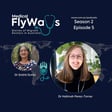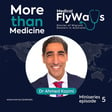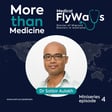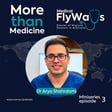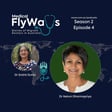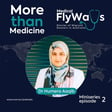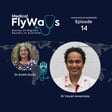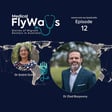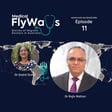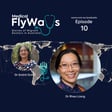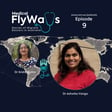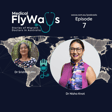Become a Creator today!Start creating today - Share your story with the world!
Start for free
00:00:00
00:00:01

Episode 4: Dr Madhu Tamilarasan
Dr Madhu Tamilarasan is UK-trained GP of Indian descent, who has found her home in rural Australia. Speciliasing in sports medicine, former athlete Dr Madhu is a highly experienced GP supervisor, having mentored many students and registrars in their journey to RACGP fellowship. In this enlightening conversation with Dr Srishti, Dr Madhu shares her journey to Australia, where she now runs a holistic clinic in Central West NSW.
Know a doctor whose story we should feature? Email info@wave.com.au
Recommended
Transcript
Maru's Journey to Australia
00:00:01
Speaker
Medical Flyways, the untold journeys of migrant doctors in Australia.
00:00:13
Speaker
Welcome, Maru. Thank you so much for being on the podcast. And can I just say I'm thrilled to have you here and get to know a bit more of your story. Pleasure. Thank you for inviting me. Looking forward to it. So as I have gleaned from other podcasts that you have done, which I will be making a plug for later, you are described as an English doctor of Indian descent who has now made Australia and specifically rural Australia her home. Yep, that sums it up. Can I start by asking what was it that attracted you to come to Australia and work here as a GP? Okay, I'll give you the short version. The short version is that I got onto a extraordinarily fantastic GP training program in the UK, South Worcestershire for anyone who knows it. And as part of that training program,
00:01:05
Speaker
You basically got ranked when you're with your entry score, and you got to choose your rotations based on your your ranking. and Fortunately for me, I ranked very highly, so I got to choose my rotations, one of which was this amazing opportunity to spend six months doing pediatrics in Katoomba in the Blue Mountains in Australia. And I thought, that sounds like fun. I will pick that rotation. Thanks very much. So that was the first time I came to Australia to work. I had already been to Australia as a medical student on my elective.
00:01:44
Speaker
and I'd seen the Blue Mountains as a day trip from Sydney, as most tourists do, and that was it. and so The idea of coming and working for six months seemed like a bit of fun. so I did that. I came for six months. I had absolutely no intention of making Australia my permanent home. I was to come for six months, and then I'd arranged six months off from my GP training program And then I was going to go back, finish my GP training and live the rest of my life in the UK. But as life happens, while I was in Catumba doing that pediatric RMO job, I met my now wife, who's Australian. And ah we did try living in the yeah UK. So at the end of that Peds job, I had six months off and I traveled a bit, went home. Leslie, my wife came as well.
00:02:36
Speaker
And within a relatively short period of time of living in the yeah UK, it became obvious that like many Australians, she missed the blue sky and the sun. and you know support, friends, family, all of those things. And so we just, I don't even know that it was a deliberate decision. It just seemed obvious really that Australia would become home. And so I finished my GP training. I finished my registrar year in August.
00:03:07
Speaker
I offered something like six or seven weeks of locum GP service to the National Health Service that had poured all this money into training me and then I left and then here I am. Fantastic and that and NHS refugee journey I think is going to be something that a lot of us can relate to.
Impact of Rural Practice on Career
00:03:24
Speaker
We often hear of that choice of going rural as being one that is almost forced upon people or one they haven't got much choice about and I do know that you would have had the choice to go anywhere in Australia and work or a significant number of places to work in. Have you ever looked back on that choice of going to work in the Blue Mountains
00:03:48
Speaker
and thought about how that influenced your career from there on? It's not something I've given a great deal of thought to, except at one stage in my career, I did get myself involved in medical education. And through a series of unexpected events, I ended up very quickly as the director of training for Western New South Wales. And I'm really quite certain that that was just right place, right time. So that bit of my career, I think it happened because I lived in Lisco. Great. And I know that your involvement with medical education has continued and and you know we are together on the board for GPS at the moment. There are certain other aspects of your journey in general practice that I'm aware of, one of which is that you have been a practice owner. Was there anything in particular that attracted you to that?
00:04:44
Speaker
Yeah, absolutely.
Becoming a Practice Owner
00:04:45
Speaker
So I was very lucky compared to so many of my colleagues and particularly my migrant GP colleagues. So I ended up in a practice in Lithgow kind of by accident. There was no advertising. There was another job that had been advertised in Lithgow, and I chose Lithgow because Leslie was already living here, so we decided only one of us would move. And I was very fortunate that Lithgow was, in those days it was called District of Workforce Shortage, it's now DPA. So we didn't have to make a choice about where to live, it was just obvious. We were going to move to Australia, we might as well live where Leslie was going to live.
00:05:27
Speaker
And I ended up at this practice by accident. I phoned them up and said, look, I'm i'm a doctor from the UK and I need a job. Do you have a job? And the practice manager said, as it happens, we do have a job. I'll organise for the practice principle to ring you and I know we kind of figured out the time difference. And the interview in inverted commas consisted of a few questions about sport and cricket. And it became apparent that I don't watch cricket and have zero interest in cricket. And I got the job anyway, despite all that. So anyway, i go I'm doing a long way around. But I ended up at a practice that I knew nothing about. I knew nothing about really. I knew very little about private general practice in Australia.
00:06:17
Speaker
And the luck was that it was a highly functional, really supportive practice environment for me. And bearing in mind, I was also newly, you know, fellowed. I'd only achieved my MRCGP in the UK in the August. And here I am in December of that same year setting out to work in a completely new system. So yes, I'm working as a you know contractor GP in this practice and I've done that for about two years and I really liked the practice and I liked the people that I worked with.
00:06:58
Speaker
And I thought, this is all fine, but I don't want to spend the rest of my life as a contractor GP. I would like to have a say and I would like to have some skin in the game as to how this practice operates and how it runs. I didn't really know that I would enjoy business as such. It was really to do with wanting a say in how how things worked on the ground. And so I asked them and it was a bit of discussion because we're they were already a reasonably large associateship and in the end they said yes and I became the seventh associate with six men. So that's how how that happened. And do you think that has helped get your career where it is in regards to general practice? Was that a crucial decision that you think helped you influence things from there on?
00:07:54
Speaker
Rather, what were the benefits of it that you can think of in hindsight?
Balancing Clinical and Business Interests
00:07:59
Speaker
ah The benefits were that I discovered I do love business. I am out absolutely passionate about the business of general practice. Depending on the day you catch me, sometimes I'm more passionate about the business of general practice than the clinical part of general practice, especially if it's been a long, hard clinical day. um So yeah, totally, totally enthralled. Love the the business aspect of it.
00:08:26
Speaker
i think i mean I feel compelled to say this here is that you know there is that having a go at most things seems to be your way of having done things. you know i'm I'm borrowing from another podcast where I've heard you speak, but it really is what I i often have this other term which I call never giver up never give up. her so you know if you If something comes your way, you're going to give it a crack. and It sounds very much like there's nothing to lose in that regard. best case scenario, you'd still be a business owner and love general practice and not the business. On the other hand, you've benefited by app finding a completely new area of interest and flourishing at it from what I've understood of your career. So do you think there's a message in there that you'd like to give to those people that come and work in Australia and possibly start off as contractors? If the fear of things not going their way is something that's holding them back, what is it that they can
00:09:21
Speaker
find out what you know what are the practical things that they can explore if there's something they think is holding them back in terms of making that next step. and I think borrowing from from somebody else that I've heard speak, there's a phrase I love. it's It's feel the fear and do it anyway. If there's something that we want to do or something that interests us, then Even if it's scary, if we don't actually grasp that and jump with it, you're never going to know. And you borrowing from the other podcast, have a crack and see what happens. like we're We're so lucky. We can try things and we've still got clinical general practice to fall back on. We're never going to be unemployed.
00:10:06
Speaker
It's very rare for any of us to be unemployed. We've got a financial safety net that the vast majority of people don't have. And so I think it can be scary and reach out to people. There's so many you know, generous people out there. So many people wanting to share their knowledge, share their experience. Not in a look at me, I'm so wonderful, do what I did way, but just in a conversational, you know, how did you get to where you are? What happened? What are the good things? What are the bad things? And most people love talking about themselves.
00:10:44
Speaker
Most people are delighted to keep talking about this. I certainly you know you and I do, so yes, that's how we've ended up here. ah You mentioned you used the phrase phrase, you got lucky in regards to the choice of practice. Now, I know that you know we've looked at the idea of practice ownership, but for someone that's coming over from another country to work in Australia, do you think there are things that they can think of when they are looking at ah you know choosing a practice that would help them get close enough to landing it right? Yes, but I think it's quite challenging to do that with no experience and understanding of the system without involving where possible somebody who's on the ground. does that Does that make sense? It does make sense, yes. I think I kind of take that on board in how I view
Comparing GP Practices: Australia vs UK
00:11:40
Speaker
things now. so
00:11:41
Speaker
I guess what the information that's often shared regarding practices is nuanced and ah terminology isn't necessarily something that they would understand. and you know and In that sense, you're right. You'd have someone almost like interpret or translate that language so you know what you're looking for and what you're choosing. it's Yes, it's even, you know just as an example, we don't really have contract to GPs in the UK. that They don't really exist. We have you know practice partners, principals, we have salary GPs, and we have locum GPs, and of course we have GP registrants. But the concept of a contract to GP doesn't really exist.
00:12:24
Speaker
So when you're coming from from the UK and you know you're being told, well, we don't generally have as many salary GPs, it's quite rare here, our model is contract to GP, and here's your contract, and it looks very much like an employment contract, when you're coming from a system where an employment contract is totally normal, It's not at all clear you know to someone coming from the UK that this is actually not really in keeping with a true contractor GP agreement. Yeah. and And I think just to clarify for those people that might be listening as well, that in principle a contractor GP is one who is a business unto themselves of sorts and they are providing a service fee to the practice for these services the practice renders them.
00:13:16
Speaker
and the patients directly pay the GP that they're seeing, it's just a model that isn't particularly one that others in other countries would have experienced. I certainly hadn't having seen and know lived and worked in India as well as the UK. So finding resources and talking to people here would be a great start and then understanding then what to choose. is what I'm hearing from you, Madhu. That's exactly right. yeah In the UK, there was this other idea that training practices were some of the best practices around, and certainly I would say that was what I experienced. Do you think choosing a training practice in Australia
00:13:56
Speaker
reflects a similar kind of ah benchmark? Unfortunately, not. so as As a board member of GPSA particularly, I would love to say yes, but the harsh reality is that I think the experience of contractor GPs in training and non-training practices alike is extremely variable.
Resources for Migrant Doctors
00:14:20
Speaker
Yeah. I know that you've refer to the idea of contacting people. I know social media is particularly useful for people to connect across the globe in the last several decade or so. Are there any particular resources or any social media groups, anything that you've seen that you would recommend the people that are coming or looking at moving to Australia? I'm not actually sure which groups ah allow in inverted commas, GPs who aren't already in Australia. so
00:14:51
Speaker
That's a great point though, isn't it? Because the majority of groups that have GPs in Australia are targeted at those that are already here, not those that are planning to come here. There's a few new ones, but I suspect I landed on them purely based on my work in this area. Have you had any connections with people coming through from the UK? Have you mentored anyone that's come along and you know gone? Madhu, your journey is one I've been inspired by. I'd like to figure out. Nope. Interesting. So I did not expect that answer. I'll tell you what though, I have been here for a while. So I moved more than 17 years ago. For the second time, my permanent move was more than 17 years ago. Facebook wasn't around then. That's interesting, isn't it? So what are those? So I kind of actually thought I'd end up on this question later on. So there seems to be almost like a progression of you
00:15:48
Speaker
have a group of people that you might interact with that are new to Australia or new to potentially you probably didn't even interact with them because you had a place to go to even before that. Did you have any social groups or you know peer groups or any such groups that you became part of here in Australia? Well, actually the group, I don't know if you remember, there was a ah group in the UK called Doctors Net UK. That's right, yep. It still does it exist to the best of my knowledge. I think it still exists, yep. So no prior to my social media Facebook obsession, dn it was DN UK obsession, and I would be on that most days for quite a lot of time. They had different forums, one of which, if memory serves me right, there was a you know doctors in or moving to Australia and New Zealand group
00:16:39
Speaker
And I'm scratching my head thinking back 18 years or so, but I'm pretty sure that I would have been active in that before I actually moved. I'm sure I received visa advice. um assistance with with stuff. But I have to say, once I moved, I actually became, you know, one of the things I've realised more recently is I've been quite ah professionally isolated until the advent of Facebook and social media. You know, living in a small country town
00:17:12
Speaker
Yeah, I have colleagues at work, I have business partners, or I had business partners before we sold our practice, but I was certainly fairly professionally isolated. So if you think of someone that didn't have that connection to an Australian rural location, which your wife is, the connection is what I'm referring to, when doctors or migrant doctors do arrive in a rural location in Australia, what do you think can help them become part of that community?
Integration into Rural Communities
00:17:48
Speaker
Yeah, tricky question. I have no particularly brilliant answers to that. But I will tell you some of the stuff that did help me. In those days, going back in time, we had divisions of general practice. And their sole purpose was to support general practice.
00:18:08
Speaker
and the rural divisions of general practice in general did that really well and I'm not even sure how they found out I had arrived but I got this, I think it was a random email from this person saying my name is, I still remember her name, my name is you know XX and I am, this is my job title at the Central West Division of General Practice and one of my roles is to support new doctors When can I come and take you out to lunch? And for me, coming from the UK, this was all really quite strange. None ah none of this happens in the UK. A random person from some organisation rings you up and takes you out to lunch. But she did exactly that. She drove all the way to Lithgow from wherever her office was.
00:18:53
Speaker
and we went out to a cafe and she'd brought with her this big folder, I still have it somewhere, of all this really useful practical information. She was most interested in whether I had children because you know part of the spiel and part of the the staff is around how do we integrate this doctor into these small country communities? And if you've got kids, well, obviously, that's that's a big thing. Where are your kids going to go to school? How are they going to make friends? And obviously, I i didn't have children at that time or now. So that was a big sort of big bit of the conversation we didn't have to have. And then she started asking me about whether you know I had a partner who needed help with integrating. I said, well, no, my partner already lives here. and
00:19:43
Speaker
So I guess I was a little unusual but for many people I think that would be quite a useful initial starting point and I am aware that some pH ends still offer that service. I know ours certainly does but it is a little hit and miss because unfortunately the pH ends are no longer so easily notified that a new doctor has arrived in their footprint. So that's certainly one area. I think the rest of it comes down to personalities and interests. So I guess, you know, people with kids probably often make some of those connections through their children's school and their school friends, parents and so on.
00:20:25
Speaker
um Some people make connections through activities, sport, music, drama, whatever it might be. And in some particularly slightly larger regional centres, there are actually you know different groups for people of different ethnic backgrounds and different nationalities, which can be helpful. Yeah, I think ah going back to that the person with the big folder that you still have, is there an element of human connection there that is worth keeping in spite of, you know as you say, the PHNs not being notified? The college certainly is aware of when GPs come over and join. Now the college is relatively unified in terms of training.
00:21:09
Speaker
I certainly remember the first person I interacted with in regards to moving over, and I met her again at GP22. I'm incredibly grateful because a lot of my journey was thanks to her. you
Advocacy as a Migrant GP
00:21:22
Speaker
know it's It's meaningful, isn't it? When someone, as you said, drives all that way to make that connection with you, you are seen. Yes, exactly right. Yeah. I wonder whether we should in some way try and bring that back, but yeah, you and I take on the world. Well, I'm sitting here thinking you and I could certainly start a social media group for doctors who haven't yet arrived in Australia, but who are thinking about it, couldn't we? ah Well, that's i'm i'm I think we're going to have a conversation, aren't we? Yeah, look, that one of the other things that I thought I would ask you about is advocating for oneself. And I'm not entirely sure why I landed on that question, but
00:22:06
Speaker
I almost feel like I've seen your journey and felt that you would have had to have done that to be where you are as an individual, as well as a GP. So as a migrant GP, when you arrive here, how do you think you can advocate for yourself well within this system? whether it's about your individual journey or the contributions that you make as a GP. Interesting. Again, I
Cultural Differences and Learning
00:22:33
Speaker
think some of this comes down to, I don't know whether it's inherent personality or things we learn along the way.
00:22:41
Speaker
But as most people who know me will tell you, I'm generally, I don't suffer fools gladly. If somebody is looking to put one over me or, you know, do me wrong, then I can't stand by and watch that happen. I'll argue about it. I'm prepared to take that on even if it's uncomfortable and even if you know it causes difficulty. i just I'll give you one small example from clinical practice. When I first arrived in Australia, I at that time had a member of staff at the practice who would do things like
00:23:27
Speaker
just put in extra patience without asking me. It's such a small, simple thing and I can't stand it. it's not It does not fit with how I work and it makes me irritable and stressed. And I think she was genuinely surprised that literally on day two, I said, this is not how I work. I will assist and I'm flexible and I'll try and help you out, but you don't get to decide where you put people in my schedule. So it's tricky for me because I've never ah i've never felt that I've had to work at advocating for myself. it's It comes naturally.
00:24:09
Speaker
Yeah, that's fascinating but for me because I would probably say exactly or something close to what you have. I guess the question came from the fact that there is, when you look at the idea of coming to a place where there are differences, you know, cultural differences and other, there are mechanisms in place, right, for allowing people to, you know, we talk about doctors that arrive in a new practice and are finding things difficult. ah We say, oh yes, for example, a trainee on the AGPT would have their ah RLO or SLO or someone to go to. But when you come here as a doctor who who hasn't trained or worked here, and most likely will ah some will come and join a practice directly, do we have any established networks or external objective ah people that you would reach out to or seek for assistance
00:25:08
Speaker
And my default, having lived in the era of social media, is often that people might reach out to someone through social media or those connections. I think there's an informal network, but you have to know someone to tap into that in the first place. And I think there's certainly a significant gap in the formalized support network for migrant doctors. And there are some, you know, There are cultural differences even, like, sure, I'm i'm of Indian origin.
Adapting to Rural Practice Expectations
00:25:44
Speaker
And so I have you know mixed culture, so to speak. But there are just some it fascinating nuances in Australia. And we have to stay humble. So again, I'm going to just just share with you a story from clinical practice, which really made me understand where I was living and how different it was to my you know very nice suburban town that I'd worked at in the UK. So I have learned over the years to be much less rigid. So I used to have very rigid rules and boundaries about how I work. I still have very strong boundaries, but I'm much less rigid with them. And I was young when I moved. I was, you know, in my mid-20s.
00:26:32
Speaker
And it's at that age, you've just fellowed, you're thinking you're pretty cool, you've moved halfway across the world, you're young, life's great, and somebody was late to see me for an appointment. And again, just like squeezing an extras, it annoys me when people are late to an appointment because it puts me behind, it makes me stressed, etc. and i It's somewhat ashamed of this story, but i without without investigating and asking for any information, I said, I'm i'm not going to see so-and-so who's arrived late. ah you know They'll have to come back another day.
00:27:10
Speaker
And that was a bit of conversation that happened and so I wasn't privy to. And eventually somebody came back to me and explained the reason why this person was late. And it was because they had sustained a fracture of their femur and had driven more than 50 minutes to see me with a fractured femur. Now this does not happen in the United Kingdom. Well, it might happen in the north of Scotland perhaps, but it certainly didn't happen in Droitwich Spa where I did my training. And I was immediately ashamed and I changed my mind and of course I saw him, you know, it all was all fine from that point of view.
00:27:54
Speaker
But it was a career changing moment for me because I sat back and I thought, you need to learn some humility. You need to just understand that things are different here. This is rural Australia. And how humbling that someone's driven 50 minutes with a broken leg to come and ask me what I think about it. Now, obviously we cutted him off to hospital, but how gia what did you do he went off to hospital. But, you know, fascinating. And this is how country folk in Australia still are. I still get the most amazing stuff that comes through my door. Amazing stuff that would never make it to a general practice in so many other countries in the world. Oh, wow. That's fascinating. I have to say, I must admit that every story I've heard about the
00:28:45
Speaker
you know the most unusual presentations in rural practice both equally scares me as well as makes me feel thrilled at the same
Unique Rural Clinical Experiences
00:28:54
Speaker
time. um Everything you say today sounds like an invitation to anyone that wants to come and work in rural Australia though. Is there any other clinical experience that you can think of that would really be unique to the Australian rural clinical practice setting or particularly to Lithco? Yep. So ah both of these involve kangaroos, but for very different reasons. One was, again, unfortunately, a very, very nasty fracture that had occurred from someone being kicked by a kangaroo. No way I would have seen that in droit witch spa. And also one of my cutest ever general practice moments was when one of my long term patients came in sort of nursing and carrying this little pouch thing.
00:29:41
Speaker
And I said, what's that? And she says, oh, I'll show you. So she puts the pouch on the ground and out hops this baby Joey, a tiny, tiny baby kangaroo. And I thought that she was just, I don't know, bringing it for her consultation, you know, just because she had to nurse it. And we did her consultation and at the end she says, now I want to ask you about the kangaroo as well. And she proceeded to ask my advice and my opinion on this skin condition that this tiny baby kangaroo had, which I couldn't answer for her because obviously um I don't know anything about skin conditions in kangaroos. But I rang my vet, who is somebody that I also, you know, know socially. And so I rang her and said, at any chance you can see this baby kangaroo while this woman's in town this afternoon? So, you know, it's
00:30:36
Speaker
It's amazing. It's absolutely amazing. I have so many stories to tell about the ah joy and beauty of living in a small community in rural Australia. I love it. I came here 17 years ago. My moratorium ended well over a decade ago and and know i I could have gone anywhere and here I still am. um and I've heard you use the word belonging in reference to the community that you are in. and I think that speaks very strongly of a relationship both ways by the sounds of it. Yeah, definitely. It's my community and I'm part of it too. Absolutely. Now, one other thing that I'd like you to have a think about. I'm going to give you three words as a rapid fire. and I want you to just think of the first thing that it
00:31:32
Speaker
speaks to you off or reminds you off. It could, you know, go with what what comes first. Okay. First one, IMG. Dislike. Second one, power. What does that mean? Okay. um Third one, purpose. Important. Something that is important to me. Okay. In an effort to make my job easier for myself. One of the things I've considered is asking the guests who come on the podcast to nominate someone else that they would like to hear from on the podcast.
Advice for Prospective Migrant GPs
00:32:13
Speaker
I'm mindful that I didn't warn you about this one, so you might go, hmm, Swishti, you've put me on the spot here. So
00:32:19
Speaker
This first series is specifically about ah female migrant GPs and those belonging to a culturally and linguistically diverse background or people of colour, whichever phrase you may prefer. Is there anyone that comes to mind that you think you'd like to hear more from if I were to invite them on the podcast? ah Yes, but I'm not sure how they would feel about me nominating them. Okay. Well, how about I will reach out to you to make an introduction and we can go from there. That sounds great. Fantastic. So any parting words of wisdom for those who haven't got here yet, but might be considering the move to Australia, anything that someone who has done it and done it with Gusto would like to say to them?
00:33:10
Speaker
Yeah, look, it's challenging. it's There's no way to dress it up. Even as the most robust, confident, everything works out perfectly in your life. Even if that's the situation, it's still challenging. But there are so many opportunities in Australian general practice for people who are game to come and have a crack and see what happens. Fantastic. The true Australian spirit and way of doing it, right? Yeah, something like that. Okay. but Great to have you, Madhu, and I really appreciate you giving ah the time to the podcast. Pleasure. Thanks for having me.
